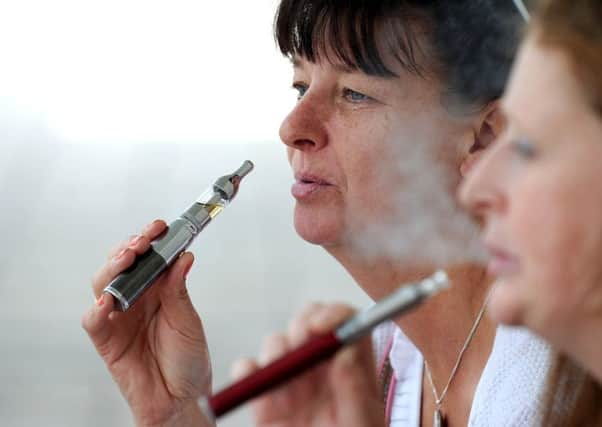Lizzy Buchan: Vaping closer to being accepted as a good thing


The colourful promotion, uncovered recently by American scientists, shows the reassuring faces of handsome doctors in white coats, who are kicking back after a hard day in the operating theatre with a well-earned fag.
It’s a jarring sight but one that shows how far our relationship with tobacco has come.
Advertisement
Hide AdAdvertisement
Hide AdWhile significant progress has been made in tackling the habit, smoking remains a major public health concern in Scotland, triggering around 10,000 deaths per year.
It is linked to all manner of ills, from dementia to cancer, and type 2 diabetes to heart disease.
The evolution of e-cigarettes has been a fascinating saga, as public health experts balanced safety fears with hopes that vaping could provide a much-needed step-change in smokers’ numbers.
When the devices first began to appear, there were panicked calls for regulation amid fears they would appeal to teenagers or could risk normalising smoking again.
Initially, all Scottish health boards banned e-cigarettes from hospital grounds except for NHS Lothian, but now NHS Greater Glasgow and Clyde has joined them in permitting vaping outside. Others may soon follow.
The devices are still controversial, as politicians in Wales failed in their attempts to ban their use in public places earlier this year.
The Scottish Government has also voted to ban their use by under-18s.
But public health experts have been moving decisively towards recommending the practice.
Advertisement
Hide AdAdvertisement
Hide AdIn the strongest guidance yet, the Royal College of Physicians (RCP) announced last week that smokers should be encouraged to vape, because the devices should be regarded as safe.
The 200-page report from one of the UK’s most eminent medical bodies waved away most of the opposition to e-cigarettes like a puff of smoke, claiming their use could have major public health benefits.
It found that the majority of people who use e-cigarettes are already using or have used tobacco, and vaping was linked to quit attempts which might otherwise not have happened.
It is clear that more research needs to be done into the risks associated with vaping, such as harm caused by inhaling the chemicals within.
But the RCP said the most up-to-date informations shows the risks are around 5 per cent of those caused by smoking traditional cigarettes.
The best thing to do is to ditch cigarettes entirely but we need to be realistic about how many people are simply going to go cold turkey just because it is better for their health.
Public Health England made a landmark recommendation last year to consider prescribing e-cigarettes on the NHS, so long as the devices are regulated. This is an important step as smoking rates soar in deprived areas and the cost of quitting aids such as nicotine gum and patches can quickly add up.
It may prove difficult to get the manufacturers on board, as e-cigarettes would have to be marketed as quitting aids to pass muster.
Advertisement
Hide AdAdvertisement
Hide AdA complex balancing act is needed to ensure e-cigarettes are easy to access for people who want to quit smoking, but regulated enough so they are kept from attracting young or vulnerable users.
This may be easier said than done but it should still give cause for hope.